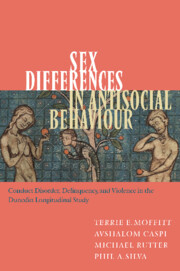 Sex Differences in Antisocial Behaviour
Sex Differences in Antisocial Behaviour Published online by Cambridge University Press: 22 September 2009
This book presents all-new findings from the Dunedin Study, which has followed 1,000 males and females from ages 3 to 21. Unlike previous studies of sex differences, we incorporate information about how antisocial behaviour changes with age over the first two decades of life, a stage when it emerges, peaks, and consolidates into antisocial disorders and serious crime. Unlike previous studies of age effects on antisocial behaviour, we iincorporate information about sex differences. This novel synthetic look at age and sex opens windows on the fundamental aetiology of antisocial behaviour, ruling out some old hypotheses and pointing to some new ones. The findings will interest students of antisocial behaviour, but the questions we frame – and the analytic approaches we use to answer them – demonstrate an approach that is applicable to any behavioural problem or mental disorder showing a sex difference.
The book incorporates approaches from three disciplines: developmental psychology, psychiatry, and criminology. Using dimensional measures of antisocial behaviour, diagnostic measures of psychiatric disorders, and measures of adjudicated delinquency and violent crime, chapters examine sex differences in the developmental course, causes, correlates, and sequelae of antisocial behaviour. We test the hypothesis that girls pass a higher threshold of risk to become as antisocial as boys, finding evidence counter to the hypothesis. We test the hypothesis that the diagnostic cut-offs defining conduct disorder should be set at a lower, milder, level for girls than for boys, finding that this is not justified.
To save this book to your Kindle, first ensure no-reply@cambridge.org is added to your Approved Personal Document E-mail List under your Personal Document Settings on the Manage Your Content and Devices page of your Amazon account. Then enter the ‘name’ part of your Kindle email address below. Find out more about saving to your Kindle.
Note you can select to save to either the @free.kindle.com or @kindle.com variations. ‘@free.kindle.com’ emails are free but can only be saved to your device when it is connected to wi-fi. ‘@kindle.com’ emails can be delivered even when you are not connected to wi-fi, but note that service fees apply.
Find out more about the Kindle Personal Document Service.
To save content items to your account, please confirm that you agree to abide by our usage policies. If this is the first time you use this feature, you will be asked to authorise Cambridge Core to connect with your account. Find out more about saving content to Dropbox.
To save content items to your account, please confirm that you agree to abide by our usage policies. If this is the first time you use this feature, you will be asked to authorise Cambridge Core to connect with your account. Find out more about saving content to Google Drive.